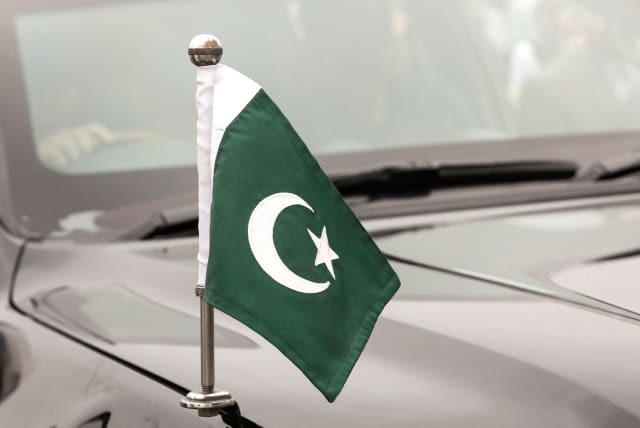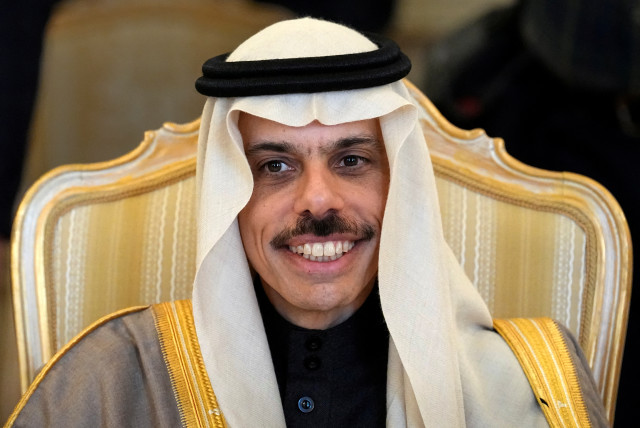Saudi delegation visits Pakistan to bolster military ties, discuss defense and Gaza cease-fire

Saudi Assistant Defense Minister Al Otaibi visits Pakistan for defense talks, following closely after a trip by Saudi FM to enhance economic ties. Both visits underscore a deepening relationship.
A high-level Saudi Arabia‘s Armed Forces delegation led by Major General Talal bin Abdullah Al Otaibi, the assistant defense minister, arrived in Islamabad on Wednesday for a 2-day visit.
A Pakistani Defense Ministry statement stated, “Otaibi will engage with the military leadership and other pertinent authorities to conclude cooperation agreements in defense-related domains.”
Otaibi’s visit follows closely after Saudi Foreign Minister Prince Faisal bin Farhan Al-Saud's two-day trip to Islamabad-the latter visit aimed to bolster bilateral economic cooperation and advance investment agreements previously agreed upon.
The Saudi delegation called on the President, the Prime Minister, and the Chairman of the General Staff of the Armed Forces.
The Saudi Foreign Minister held detailed talks with Foreign Minister Muhammad Ishaq Dar at the Foreign Affairs Ministry.
The high-level Saudi delegation led by Prince Faisal bin Farhan Al Saud also attended the Saudi Arabia-Pakistan Investment Conference held in Islamabad on Tuesday.
Saudi delegation seeks snvestments

In the Saudi delegation, key figures such as the Saudi Deputy Minister of Investment Engineer Ibrahim bin Yusuf Al Mubarak, the Saudi Minister of Environment Water Resources and Agriculture Engineer Abdul Rahman bin Abdul Mohsen Al-Fazli, and the Saudi Minister of Industry and Mineral Resources Engineer Bandar bin Ibrahim bin Abdullah Al Kharif, were prominent participants.
According to Pakistan’s Foreign Affairs Ministry, “The Pakistan side assured the Saudi side of maximum support and facilitation in fast-tracking the Kingdom’s prospective multibillion-dollar investments in Pakistan.”
Pakistan and Saudi Arabia issued a joint call for a cease-fire in Gaza, emphasizing the need for de-escalation in the region. Additionally, while addressing a joint press conference with Al-Saud also urged an immediate cessation of war in Gaza.
Both Foreign Ministers expressed concern at the deteriorating situation in the Middle East. However, they refrained from directly addressing Iran's recent strike on Israel.
Al-Saud emphasized the situation's urgency, deeming it unacceptable and an apparent failure of the international system, noting, “The reality is that the international community is falling short of its responsibility. There's a pressing need for us to intensify our efforts to halt the ongoing violence and bloodshed."
He pointed out that the humanitarian crisis in Gaza was already exacerbating tensions and emphasized the urgent necessity to avoid further conflict in the area.
Accelerating investments in Pakistan
Dar also urged an immediate and unconditional cease-fire in Gaza.
As outlined in a statement from the Pakistani foreign ministry, “The high-level delegation of Saudi ministers visited Pakistan following a meeting between Saudi Crown Prince Mohammed bin Salman bin Abdul Aziz and Prime Minister Shahbaz Sharif earlier this month in Makkah. During the visit, both countries agreed to expedite the implementation of an investment package.”
Meanwhile, during his address to the federal cabinet meeting on Wednesday, Pakistan's Prime Minister Shahbaz Sharif expressed optimism regarding the visit of the Saudi delegation, foreseeing a substantial influx of billions of dollars in investments into Pakistan as a direct outcome.
The Prime Minister emphasized the importance of ensuring the completion of projects across the country with the incoming investment, stressing the need for hard work and dedication to achieve this goal.
Ata Ullah Tarar, the federal information minister, told The Media Line, “The Saudi leadership is keenly cognizant of the immense potential and opportunities for investment in Pakistan. This awareness has led them to express their readiness to invest their capital in the country.”
Tarar continued, “Our policy is that we are not inclined towards aid but rather towards trade. Pakistan holds a significant position in the region, and the sustenance of this importance hinges solely upon the strength of our trade and economy.”
Strengthening Pakistani-Saudi relations
“Pakistani-Saudi relations have historically been characterized by friendship and cooperation. The presence of two million Pakistani workers in Saudi Arabia further strengthens these ties, serving as a vital source of foreign exchange for Pakistan.”
Mohammed Alhamed, a Saudi geopolitical analyst and president of the Saudi Elite consultancy group, told The Media Line, “The consecutive visits of Saudi officials to Pakistan signify a substantial endeavor to enhance bilateral relations, especially in defense and economic spheres.”
“The longstanding defense partnership between Pakistan and Saudi Arabia, alongside recent top-level interactions, underscores Saudi Arabia's backing of Pakistan and a shared dedication to regional security and collaboration,” Alhamed added.
“Pakistan’s proactive stance aligns with Saudi Arabia's objectives in promoting stability and combating security threats in the Middle East. Considering the broader context of the Hamas-Israel and Iran conflict, these developments suggest that Saudi Arabia is actively engaging to resolve the regional conflicts in a broader context.”
Alhamed noted, “Overall, the evolving Saudi-Pakistani relations in defense and economic spheres may play a crucial role in shaping regional dynamics amid the complex geopolitical landscape involving Iran, Hamas, and Israel.”
Saddam Hussein, an economist and assistant chief of policy at the Pakistan Institute of Development Economics (PIDE), a postgraduate research institute and public policy think tank at Quaid e Azam University Islamabad, told The Media Line, “While Riyadh's overture towards Pakistan signifies a boon for the latter, grappling with formidable economic challenges, it is imperative to temper enthusiasm with pragmatism.”
Balancing Saudi investment
"Saudi investment, while welcome, must be accompanied by concerted efforts to fortify the domestic economic landscape. This necessitates the implementation of long-overdue reforms; these reforms span diverse domains, encompassing deregulation, civil service restructuring, digitalization, universal access to the internet, tax simplification, promotion of a truly market-oriented economy, and assurance of policy certainty."
He continued: “Only through such concerted endeavors can the realm of possibility translate into tangible progress, as history aptly attests.”
Amina Qureshi, assistant policy chief at PIDE, told The Media Line, “With limited fiscal space, Saudi investment of 5 billion dollars might give a breathing space to the dying economy. Nevertheless, we need to learn from our past experiences (CPEC) and our neighbors too. So far, foreign investors in Pakistan have been attracted to consumption-oriented sectors (due to the market size) while near to no investment is in the export-oriented sector or upgrading existing technology.”
Qureshi noted, “Saudi investment in agriculture, mining, or any other sector will only be beneficial if the sectors end up producing value-added exports for Pakistan.”
"Providing special protection or incentives to foreign investors has proven to be detrimental to the economy in the past. Competition and a conducive business environment for all investors, both domestic and foreign, are imperative for Pakistan's economy to flourish."
On the other side, since the 1970s, Pakistan has been actively training Saudi soldiers and pilots, reinforcing the bilateral defense cooperation between the two nations.
Strategic alliance
Pakistan and Saudi Arabia have stood together during regional challenges, demonstrating unwavering support for each other's security interests. Whether through military assistance, counterterrorism efforts, or diplomatic initiatives, both nations have consistently shown their commitment to preserving peace and stability in the region.
Pakistan Army, experienced in countering insurgencies and extremism, complements Saudi Arabia's efforts against significant terror threats, particularly from the Houthis.
Their military cooperation promises to enhance regional security through intelligence sharing, coordinated counter-terrorism efforts, and strengthened defense capabilities. This collaboration symbolizes a unified front against terrorism, reaffirming a mutual commitment to regional peace.
General (Retired) Raheel Sharif, the former chief of the Pakistan Army, currently commands the Islamic Military Counter Terrorism Coalition (IMCTC), an intergovernmental military alliance headquartered in Riyadh. The coalition, which comprises 41 member states from the Muslim world, is united in its efforts against the Islamic State and other terrorist activities, including groups like the Houthi militia in Yemen.
Under General Sharif's leadership, the IMCTC conducts joint operations, intelligence sharing, and coordinated efforts to combat terrorism and promote regional stability.
Brigadier General RA Malik, an Islamabad-based defense analyst, told The Media Line, “Pakistan's military battle-hardened expertise and collaboration with Saudi Arabia may bolster the latter's defense capabilities and contribute to deterrence efforts in the region.”
He continued, “While the military cooperation between Pakistan and Saudi Arabia has the potential to positively influence regional security dynamics, its long-term impact remains contingent upon prudent diplomacy, conflict resolution efforts, and a nuanced understanding of the complex geopolitical landscape of the Middle East.”
“As two influential players in the Middle East and South Asia, respectively, Pakistan and Saudi Arabia‘s collaboration signals a unified front against common security threats. This partnership strengthens bilateral ties and fosters stability across the broader region, potentially deterring adversaries and promoting a more secure geopolitical environment.”
Jerusalem Post Store
`; document.getElementById("linkPremium").innerHTML = cont; var divWithLink = document.getElementById("premium-link"); if (divWithLink !== null && divWithLink !== 'undefined') { divWithLink.style.border = "solid 1px #cb0f3e"; divWithLink.style.textAlign = "center"; divWithLink.style.marginBottom = "15px"; divWithLink.style.marginTop = "15px"; divWithLink.style.width = "100%"; divWithLink.style.backgroundColor = "#122952"; divWithLink.style.color = "#ffffff"; divWithLink.style.lineHeight = "1.5"; } } (function (v, i) { });
